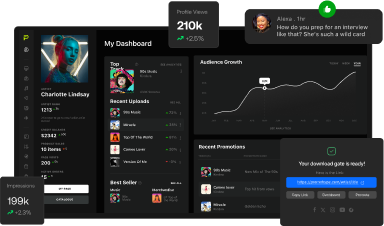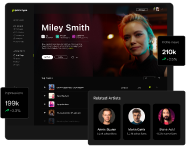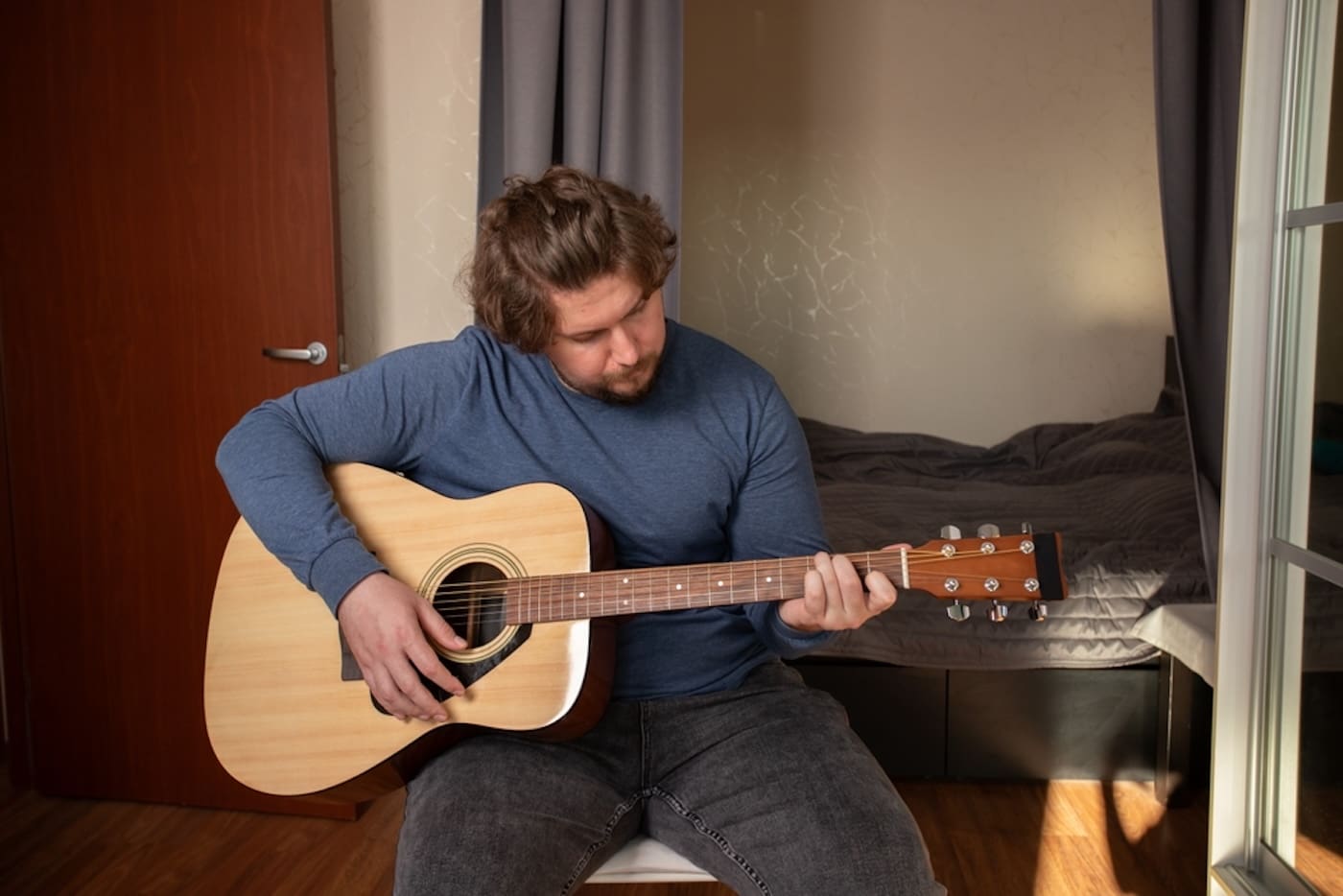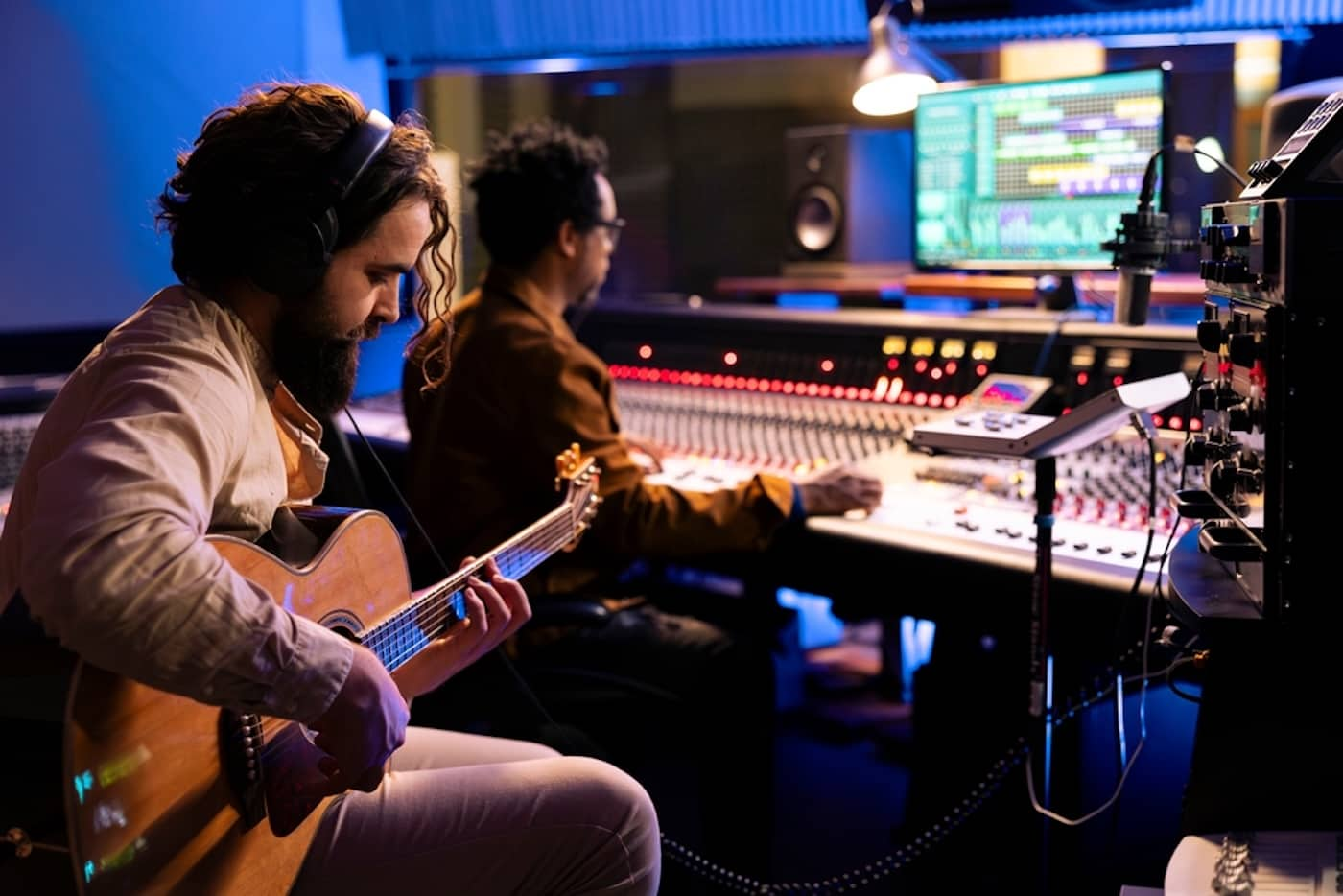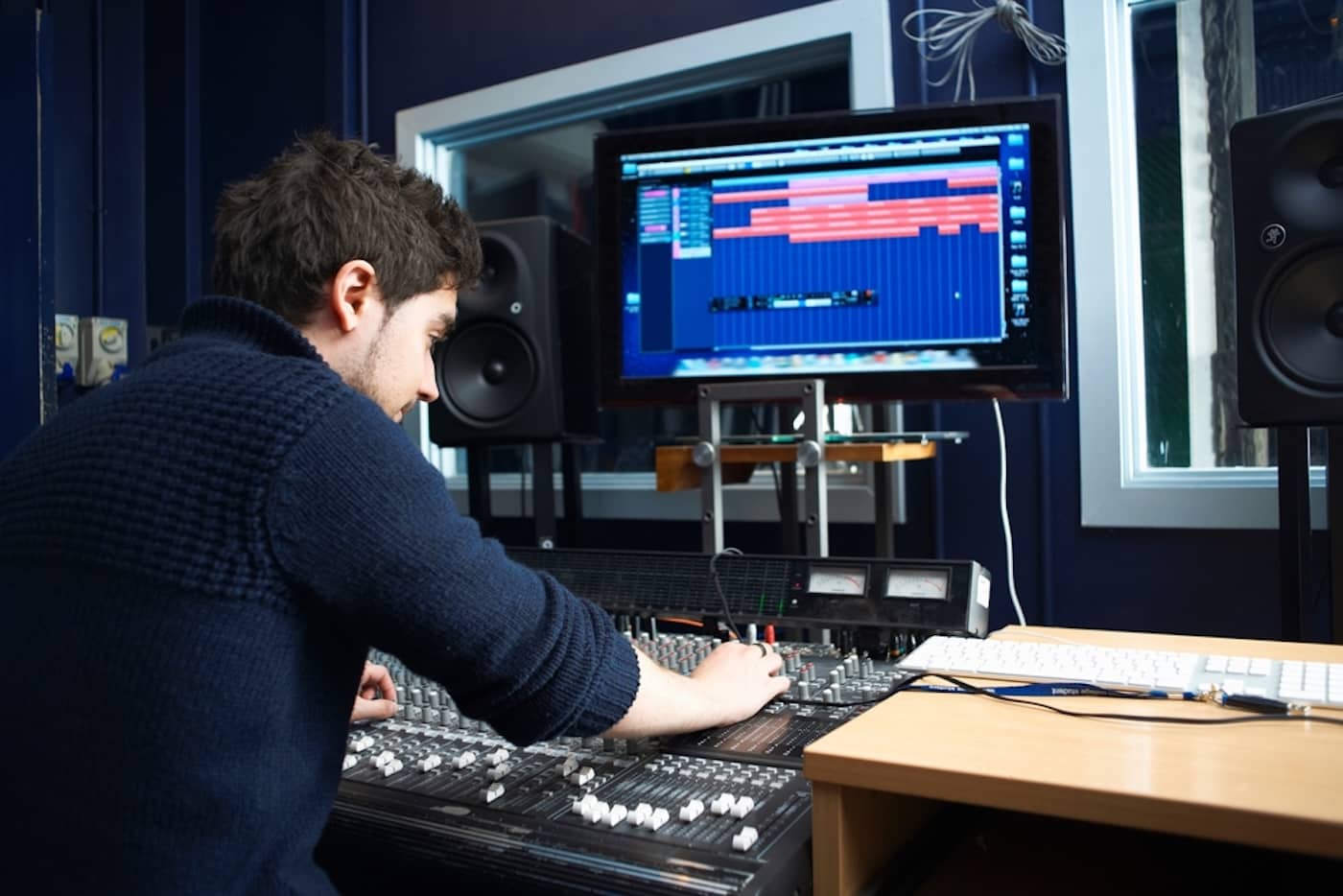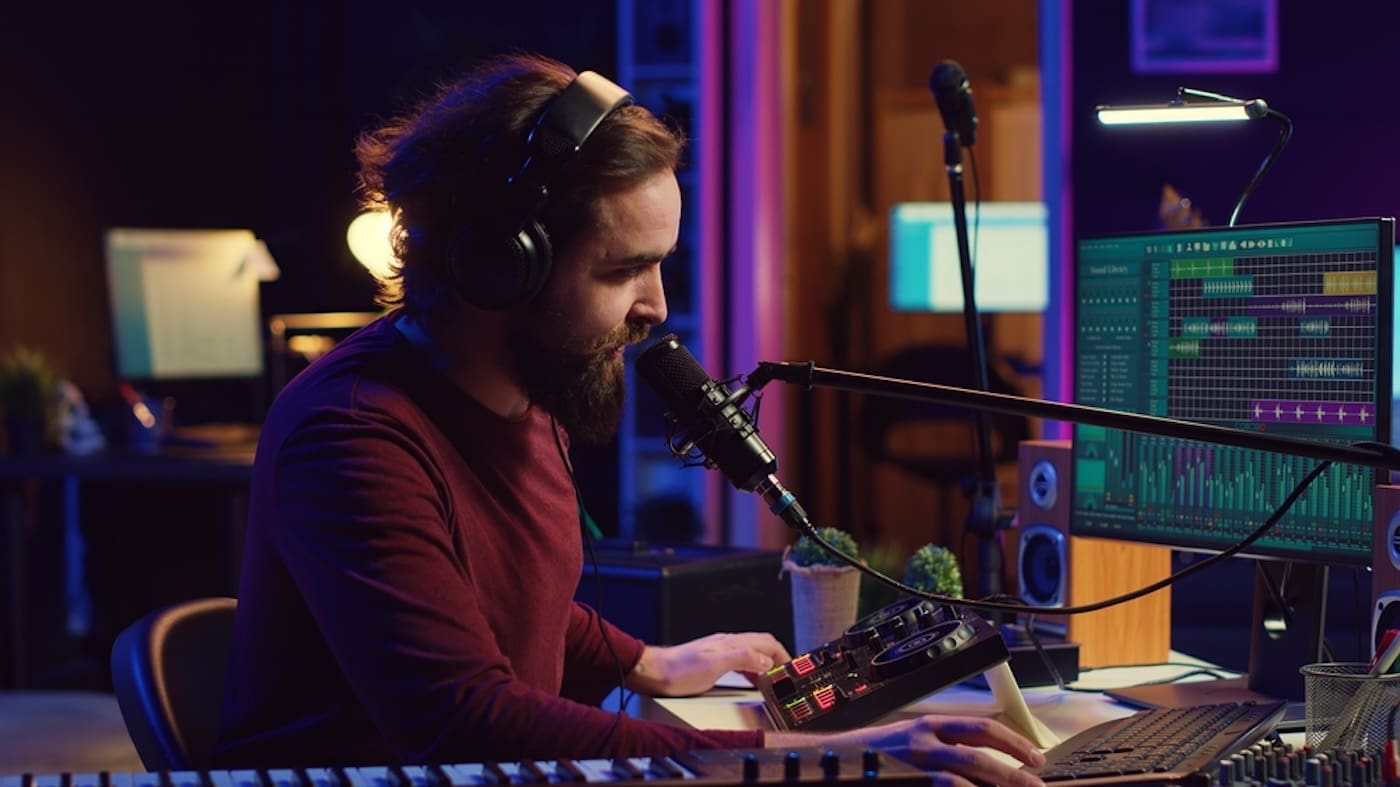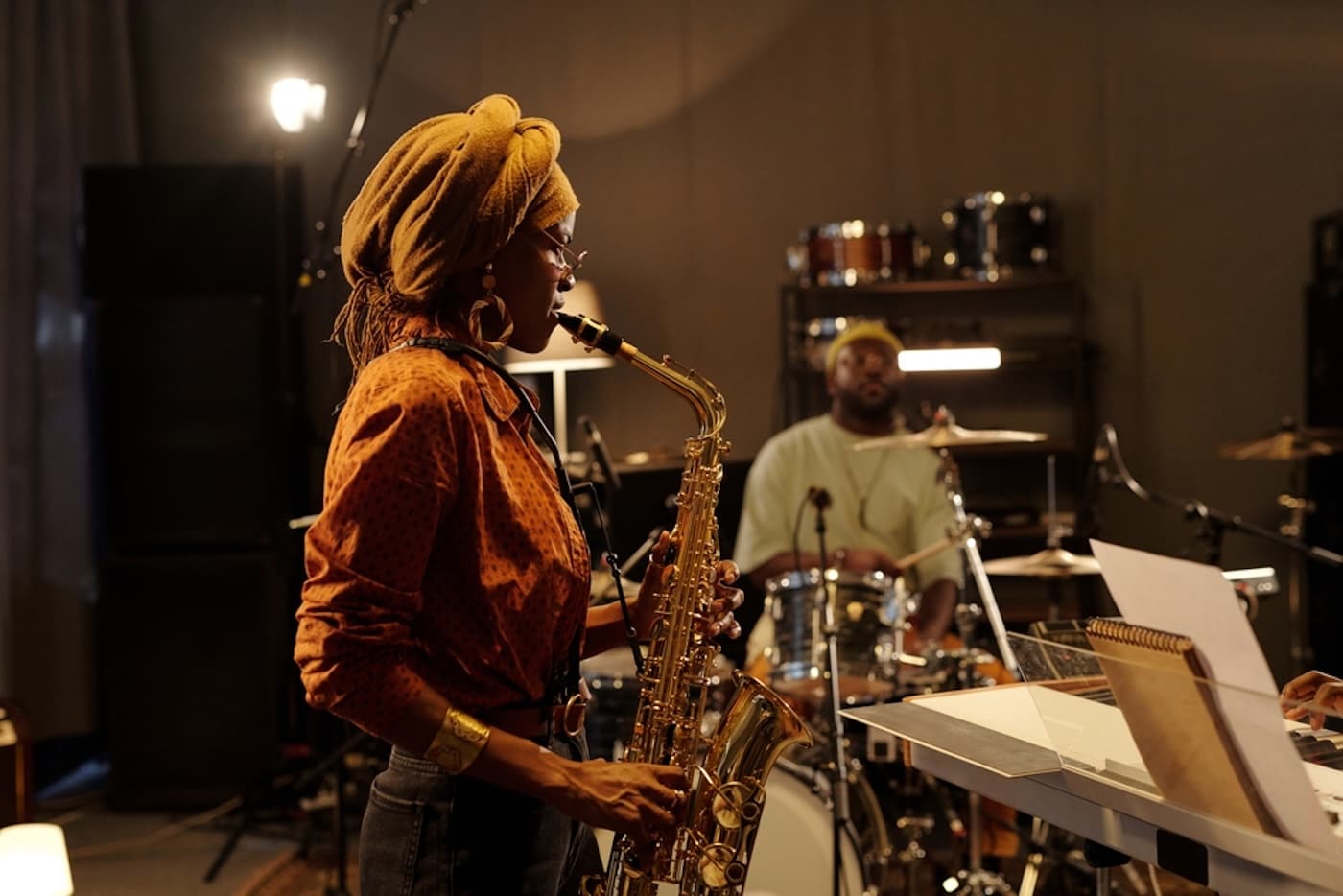
Every independent artist dreams of turning their passion into income, and in today’s digital world, that goal is more achievable than ever before.
From streaming royalties to merch and fan support, new opportunities make it easier to earn a living from your music.
In this guide, you’ll learn how to make money as an independent artist while keeping full control of your creativity and career.
Get Early Access
To Promo Hype
What Is An Independent Artist?
An independent artist is a musician, songwriter, or music producer who operates outside the control of major record labels.
By working independently, they can retain complete creative control over their music career and make critical business decisions.
Many independent artists choose to self-release through their own labels, supplementing music sales with live performances and other revenue streams.
The most successful independent artists have consistently dominated the charts, earning a substantial income and achieving financial stability.
Why Become An Independent Artist?
The advent of accessible music creation tools and technological innovations has revolutionized the way indie artists create and promote their work.
From affordable software for making music to direct fan engagement on social media, it’s the best time to be independent.
The arrangement ensures complete creative control over your work, along with full ownership of your masters and copyright.
This enables indie artists to control their finances, decide on release schedules, and focus their efforts on optimal revenue streams.
Independence also allows artists to record music and establish a brand identity that reflects their core values.
Related reading: How to make money as a music producer.
How To Make Money As An Independent Artist: Step-By-Step
Whether you’re a singer-songwriter or an electronic music producer, the core steps for monetization remain the same.
Here’s everything you need to know to make money as an independent artist and stand out in a competitive industry:
Step 1: Build An Online Presence
The first step to monetizing your music is to build a strong online presence, including a dedicated website and active social media channels.
If you don’t have a site, you can research the best band websites to see how established acts promote their music online.
A website is also an excellent platform for direct sales through an online store, whether selling merchandise or event tickets.
Likewise, social media platforms are vital for engaging with your fans, evaluating the reception of your music, and networking.
By focusing your efforts on these platforms, you can increase your chances of going viral on TikTok and hitting the million-streams milestone.
Step 2: Host Live Performances
Building a core audience of loyal fans often begins at the grassroots level, performing gigs in coffee shops and other local venues.
Generating a buzz doesn’t have to be costly, and you can reach out to local businesses when planning upcoming gigs.
Collaborating with other artists is also an excellent way to get gigs as a musician, marshalling your collective fan base for promotions.
You can also consider performing at private events, house concerts, and charity fundraisers alongside other performing artists.
Learn more: How to get signed to a record label.
Step 3: Monetize On YouTube & Twitch
While most indie artists focus on monetizing their music, YouTube and Twitch offer new opportunities to generate income.
For YouTube, creator monetization covers everything from channel memberships and ad monetization to fan funding through SuperChats.
It’s also handy for sharing online tutorials, behind-the-scenes footage, and music videos, all of which can build your reputation.
Alternatively, Twitch focuses on monetization through live streams, with affiliate and partner programs also available to users.
Step 4: Sell Merchandise
Merchandise has long been a staple source of revenue for indie artists, selling band posters and T-shirts at live shows.
Today, you can sell merch through various online platforms, using print-on-demand services to avoid manufacturing costs.
In addition to T-shirts and posters, consider selling stickers, badges, and other collectible items that fans will love.
You can start selling merch by implementing music marketing strategies that promote new products on social media and streaming platforms.
Step 5: Seek Brand Partnerships
A recent trend in the music industry has seen major brands utilize indie artists to establish connections with potential customers.
If you’ve developed a clear brand identity, reaching out to like-minded businesses can be a good way to earn money.
Consider approaching music equipment and instrument manufacturers to request early access to their upcoming products.
Ensure your pitch is tailored to the brand’s PR manager, and utilize platforms like LinkedIn to compile a shortlist of options.
Get Early Access
To Promo Hype
Step 6: Release Physical Media
While streaming platforms dominate music lovers’ listening habits, physical media still plays a strong role in monetization strategies.
Many of the best music producers of all time have released outstanding limited-edition releases that collectors highly seek.
Experiment with selling limited physical releases of EPs and albums to see what works, supplementing streaming revenue with CD sales.
You can promote them through your website, selling CDs and records on Bandcamp, Discogs, Etsy, and local record stores.
Step 7: Sell Music Lessons
If you’re an experienced singer-songwriter or producer who knows how to write a song, this knowledge can become another revenue stream.
Selling music lessons can begin with introductory courses on song structure, followed by exploration of advanced techniques.
Your students can choose to pay per lesson or a monthly fee to access all content, so a transparent pricing structure is vital.
Contacting nearby music schools and building an online presence will allow you to attract new students eager to learn more.
To deliver the best experience, you should play to your strengths, whether it’s reading sheet music or mastering audio compression.
Step 8: Crowdfund New Music Projects
Anyone who has become a music producer appreciates the financial challenges that come with working on a new project.
For indie artists, crowdfunding can provide the monetary support necessary to record, edit, and mix songs to a professional standard.
Popular crowdfunding platforms, such as Patreon and Kickstarter, enable fans to support creators directly through donations.
In return, they receive a reward upon completing the project, such as a free digital copy of the album or a signed physical copy.
You can also use crowdfunding as a musician to finance music videos and tours, which in turn support other monetization streams.
Step 9: Sell Digital Downloads
Platforms such as Bandcamp, iTunes, and Amazon Music are at the forefront of digital music downloads for music fans.
As such, they should be integrated into a revenue strategy to earn income from singles, EPs, albums, and other releases.
Digital download sales may also generate mechanical royalties, which are paid to songwriters for each sale of their work.
To ensure you’re eligible for these royalties, you’ll need to register with a collection organization like the Mechanical Licensing Collective.
Step 10: Publish Your Music On Streaming Services
Distributing music on streaming platforms is ubiquitous for all artists, whether small indie singers or bands signed to major labels.
While revenue from streaming platforms can be relatively low, the value of these platforms extends well beyond monetization.
Popular streams on Spotify, Apple Music, and other platforms can significantly boost income from different sources.
You can use them to promote upcoming events, physical and digital music releases, and new merchandise.
Managing multiple platforms can also be streamlined by using a music distribution service that handles release schedules and uploads.
Also read: Mechanical royalties vs. performance royalties.
Pro Tips For Maximizing Income Streams
Handling multiple income streams as an independent artist can be a challenge that distracts from the creative process.
Here are some tried-and-tested tips for maximizing your income streams when promoting your own music:
- Collaborate with other artists: Collaboration opens up new creative possibilities and access to a larger network of music lovers eager for more content.
- Apply revenue diversification: While it can be tempting to focus on a limited set of monetization streams, diversification can drive significant revenue growth. Monitor the performance of different income streams and adjust your strategy accordingly.
- Improve your equipment: Once you start making money, reinvest in better music production equipment to enhance the quality of your music. By polishing your original music, it’s more likely to capture the attention of music industry professionals.
- Engage with your fans: Fan engagement on social media and elsewhere costs nothing, but can pay off significantly through word of mouth. It’s also an opportunity to drive music sales and streams on platforms like Apple Music and Spotify.
You can also submit music to radio stations, gaining additional exposure that attracts like-minded music fans to your work.
Common Financial Challenges (And How To Overcome Them)
Building a music career as an independent artist can pose significant financial challenges, ranging from recording studio fees to tour accommodations.
Here are some common challenges indie artists face and the steps you can take to overcome them:
- Inconsistent revenue streams: Perhaps the biggest obstacle to turning music into a full-time job is the lack of consistent income, particularly early in a music career. This can be countered by continual diversification to capitalize on all available opportunities.
- Complex licensing and royalty structures: Music licensing, royalties, and other contractual issues can be a minefield for the uninitiated. If you don’t have artist management, seek independent legal advice when negotiating any deals.
- Lack of professional facilities: Newcomers to the music scene often lack the facilities needed to mix and master their productions. You can use affordable services online to elevate the quality of your music without breaking the bank.
Fortunately, budget-friendly solutions and music production courses are available to help overcome these challenges and achieve success.
Essential Tools & Resources for Independent Artitsts
When it comes to the tools and resources needed to succeed, independent artists have never been in a better position.
These are just a few of the exceptional tools indie artists can access for production, distribution, and marketing tracks:
- Free music production software: Budget-conscious independent artists can achieve exceptional results using the best DAWs on the market. Free software, such as GarageBand and Audacity, offers competent features when used correctly.
- Marketing content creation tools: Programs like Canva, GIMP, and Adobe Express are robust tools for music marketing, helping create branding elements and promotional campaigns.
- Music industry analytics tools: Data analytics is critical for driving monetization strategies, from Chartmetric’s listener insights to general metrics through Google Analytics. Using these tools enables independent musicians to stay informed about the latest trends in popular music genres.
With hundreds of free VST plugins released annually and AI-powered tools constantly emerging, indie artists have many resources to choose from.
Emerging Opportunities In The Future Of Independent Music
The rapid pace of technological evolution has created a broad range of potential opportunities for indie artists to capitalize on.
Some of the hottest trends reshaping how independent musicians and producers earn money include:
- Blockchain music distribution: The advent of blockchain distribution is poised to be a game-changer for independent artists. It promises to strengthen ownership of music content, addressing ethical concerns about AI.
- VR concerts: The rise of VR concerts is enabling independent musicians to reach a global audience without the high costs of touring, redefining how live gigs are performed.
- AI music tools: With powerful new AI music production tools, artists can streamline production processes without compromising their artistic vision.
By paying attention to future trends in music distribution, artists can continue to earn a decent income by sharing their passion for music.
Read this next: What does a music producer do?
FAQs About Making Money As An Independent Artist
Monetization for independent artists can be complicated, but these answers to some of the most frequently asked questions cover some additional noteworthy points:
How much money can I make as an independent artist?
The income range for independent artists varies widely, typically from hundreds to tens of thousands of dollars per month.
This range is influenced by the size of your audience, your available discography, and the frequency of your tours.
How are royalties split between creators?
Royalty splits typically depend on who owns the rights and whether the tracks are released independently or through a music publisher.
In many cases, the writer and publisher take a 50/50 split, with the level of contributions determining the collaboration split.
Do artists get royalties every time a song is played?
Not all song plays initiate royalties, although streaming platforms, radio broadcasts, and live venues can be used to collect performance royalties.
To ensure full payment from plays in venues, artists must register with a Performing Rights Organization, such as ASCAP and BMI.
Summary
New technologies and digital platforms have made it easier than ever for independent artists to earn a living from their music.
By combining streaming royalties, merch sales, crowdfunding, and live performances, you can create multiple steady income streams.
With consistency and strategy, your passion for music can grow into a thriving, long-term career.
Get Early Access
To Promo Hype
Join Promo Hype
